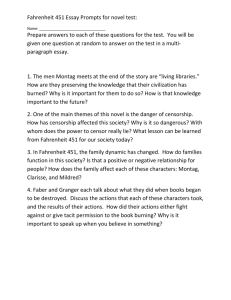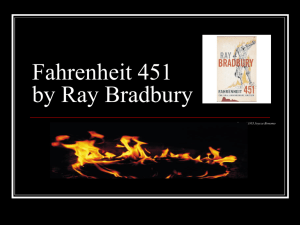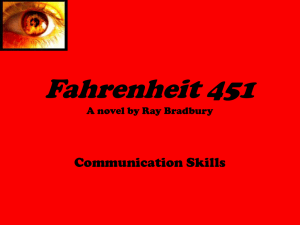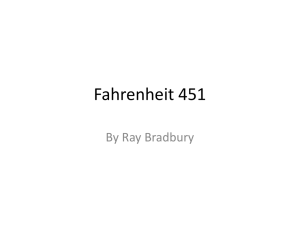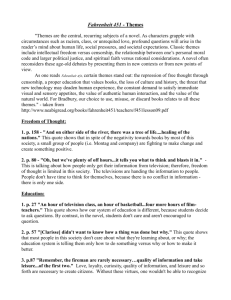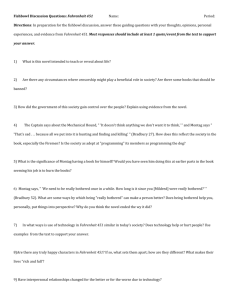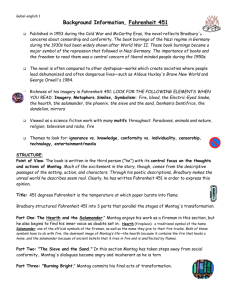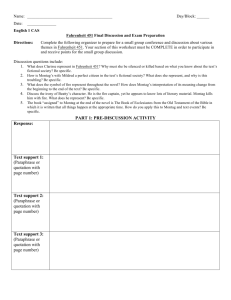Fahrenheit 451 info - Cherokee County Schools
advertisement
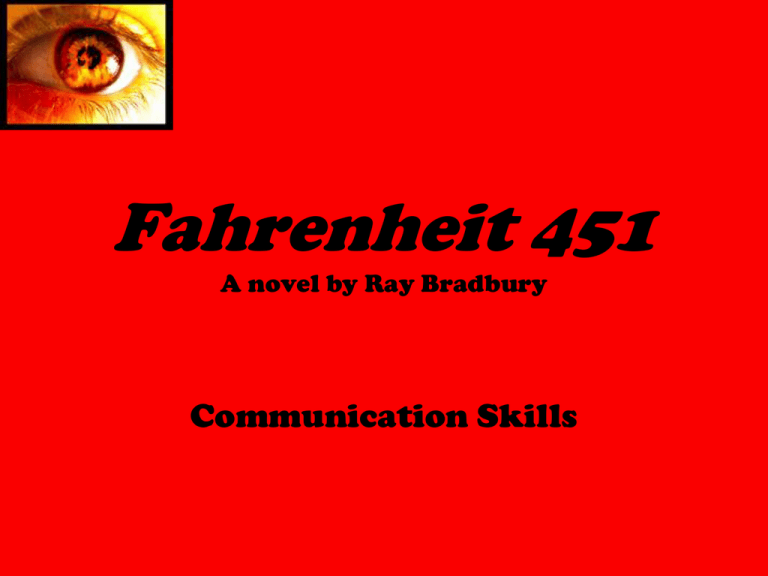
Fahrenheit 451 A novel by Ray Bradbury Communication Skills Context • Published in 1953 • Post-World War II era • Nazi book burnings of the 1930s were widely published after WWII – became a major symbol of the repression in Nazi Germany Context • Television became dominant medium for mass communication – – – – 1946: 7,000 TV sets existed in the U.S. 1948: 148,000 sets 1950: 4.4 million sets Television vs. books – debate over bringing television into schools because reading level of students was dropping • The importance of books and the freedom to read them was a central concern of liberal-minded people during the 1950s. Context (McCarthyism) • McCarthy trials – Senator Joseph McCarthy – McCarthy made a public accusation that more than two hundred “card-carrying” communists had infiltrated the United States government. Incited a huge “communist scare,” which helped lead to the Korean War and the Cold War. – McCarthy accused many Army officials of espionage and communist ties. – He also focused on writers and filmmakers, creating a great debate on artistic freedom. Context (McCarthyism) • Thousands of people lost their jobs as, all across America, state legislatures and school boards mimicked McCarthy and his House on Un-American Activities Committee. • Books were even pulled from library shelves, including Robin Hood, which was deemed communist-like for suggesting stealing from the rich to give to the poor. • Above all, several messages became crystal clear to the average American: Don’t criticize the United States. Don’t be different. Just conform. • By 1953, his accusations were at their height. His hearings were held in 1954 and were the first to be publicly broadcast (ruined his reputation and career). Context • Fear of robots and other technology was prevalent in the 1950s (“mad scientist” movies compounded such fear by portraying machines that turned on their creator). • Mentality of hard work and following orders to get ahead was prevalent at this time. • Atmosphere of fear and repression left over from WWII, development (and use) of atomic bomb, communist scare, the Cold War, and McCarthy made it possible for government or any other powerful group to manipulate public opinion. Context • Mob mentality vs. individual rationalization • Silence of those who were intimidated and the indifference of those who didn’t can lead to further manipulation in any time period! • “Written five years after the end of the 2nd World War at the advent of the Korean War, Bradbury’s book evokes an atmosphere of entrapment… and the unmistakable apprehension of individuals living in fear of an authoritarian government.” Censorship • “the suppression of speech or deletion of communicative material which may be considered objectionable, harmful or sensitive, as determined by a censor” Censorship in History In 1497 the Bonfire of the Vanities, preached by Girolamo Savonarola, consumed pornography, lewd pictures, pagan books, gaming tables, cosmetics, copies of Boccaccio's Decameron, and all the works of Ovid which could be found in Florence. Censorship in History • Burning books is often associated with the Nazi regime. On May 10, 1933, Nazis in Berlin burned works of Jewish authors, and the library of the Institut für Sexualwissenschaft, and other works considered "unGerman". Censorship in History In 1948, at Binghamton, New York children - overseen by priests, teachers, and parents publicly burned around 2000 comic books. • In May 1981 Sinhalese police officers on rampage burned the public library of Jaffna, northern Sri Lanka; a huge library collection, which was the second largest library in Asia, was destroyed: 97,000 books and very rare collection of ancient palm leaf volumes were among them Censorship Ironically, Bradbury’s publishers, unknown to him, “cleaned up” or deleted some of the language that Bradbury used in Fahrenheit 451 in order to make the book saleable to the high school market. What are some things that get censored in today’s society? Overview • Guy Montag is a fireman who burns books in a futuristic American city. In Montag’s world, firemen start fires rather than putting them out. The people in this society do not read books, enjoy nature, spend time by themselves, think independently, or have meaningful conversations. Instead, they drive very fast, watch excessive amounts of television on wall-size sets, and listen to the radio on “Seashell Radio” sets attached to their ears. • Montag will meet a 17-year-old girl named Clarisse McClellan, who will open his eyes to the emptiness of his life by enjoying those things that her society tells her not to. • A series of strange events will unfold for Montag, causing him to question his life, his career, and his society. Montag will turn to books for answers, which is strictly forbidden in his society. Overview • Protagonist: Guy Montag • Antagonist: Society as a whole and, specifically, Beatty • Narrator: Third person limited from Montag’s perspective • Setting: Some time in the twenty-first century; two atomic wars have taken place since 1990; in and around an unspecified American city Themes to Consider Themes to Consider • Censorship, obviously… Themes to Consider • Ignorance/Knowledge • Throughout the novel, the reader is presented with a conflict between knowledge and ignorance. What does true happiness consist of? Is ignorance bliss, or do knowledge and learning provide true happiness? Montag, in his belief that knowledge reigns, fights against a society that embraces and celebrates ignorance. Themes to Consider • Animal Imagery • In the opening paragraph, the burning book pages are compared to birds trying to fly away. When Millie attempts suicide, Montag compares the tool used to save her to a snake. The Mechanical Hound is a dominant presence throughout the novel. The image of the salamander is dominant as well, as a symbol of the fireman. In addition, the story of the Pheonix plays a prominent role. Themes to Consider • Technology • Technology in Bradbury's 24th century is highly advanced. Television screens take up entire parlor room walls and characters can speak directly to the listener, addressing him or her by name. People rely on inventions such as the Mechanical Hound and the snake-like tool used to save Millie's life after her suicide attempt. People drive cars at speeds of 150mph and above. Technology dominates society. Themes to Consider • Religion • Although it appears no character in Fahrenheit 451 holds any religious beliefs, Bradbury includes many religious references in this novel. The book Montag saves from the old woman's house is The Bible… which is the book he says he will memorize in order to one day, in a new society, reprint. Themes to Consider • Conformity vs. Individuality • Paradoxes • Apathy and Passivity • Alienation and Loneliness • Change and Transformation Works Consulted • “Fahrenheit 451: The United States in the Post-war Years.” http://www2.tpl.lib.wa.us/v2/news/e vents/451/context.htm • “McCarthy Hearings.” http://www.u-shistory.com/pages/h1769.html • “Fahrenheit 451 (Historical Context).” http://www.answers.com/topic/fahre nheit-451-novel-5
